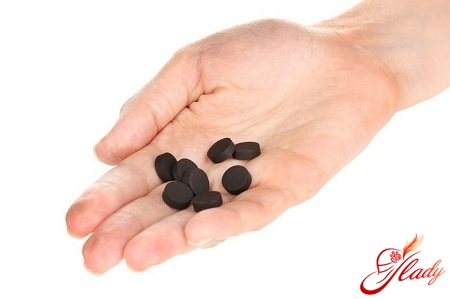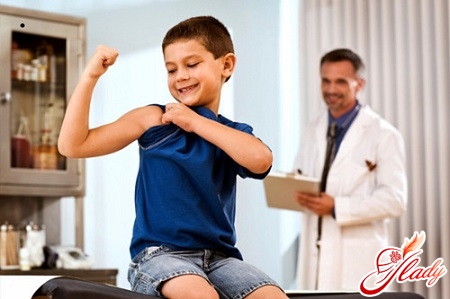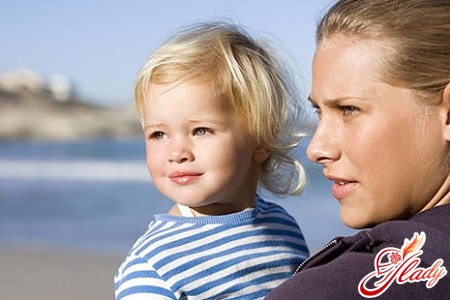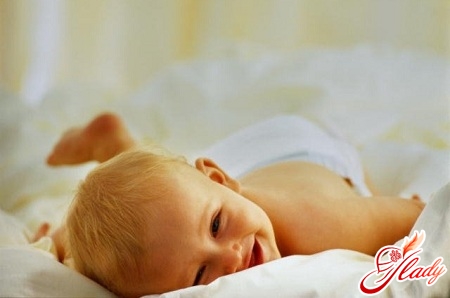 Any pregnant woman with impatience andwith a sinking heart waiting for the birth of his crumbs. In her mind swirls of cute angels. However, those crumbs, which my mother sees in the rod, are often very far from my mother's expectations. But only a month will pass - the other and the children will change beyond recognition. So, what happens to the newborn baby in the first month of life? What should be the care of a newborn baby?
Any pregnant woman with impatience andwith a sinking heart waiting for the birth of his crumbs. In her mind swirls of cute angels. However, those crumbs, which my mother sees in the rod, are often very far from my mother's expectations. But only a month will pass - the other and the children will change beyond recognition. So, what happens to the newborn baby in the first month of life? What should be the care of a newborn baby?
Features of bathing a newborn baby
As a rule, on the very first evening after discharge frommaternity home is a significant event for all young parents of the event - bathing a newborn baby. In the event that the baby is not the first in the family, bathing will not cause any particular difficulty for the parents. But if the baby is the first in the family, young dad and mother can become confused. Any little thing scares them - a newborn baby hiccups or cries, and they no longer know who to run for help. The first month of the child's life becomes a real battle baptism and a test of strength. It is for them that the necessary information is listed below. For bathing crumbs in the first two weeks of life, until the umbilical wound does not heal completely, it is necessary to use only a boiled ome, in which it is desirable to add a little potassium permanganate. But be careful - the water should have a slightly noticeable pinkish hue. By the way, pay attention to the following aspect - in any case do not add the broth directly to the bath. Manganese has the property of causing very severe burns not only of the mucous membranes, but also of the skin. And especially so tender as a newborn baby. In order not to allow this, doctors advise to dilute potassium permanganate in the following way. Pour a few crystals of manganese into a small container, fill them with water and carefully dissolve. Then from the tank, pour the solution of manganese into the tub, but only through the gauze cloth! This measure is necessary in order to completely eliminate the possibility of getting the undissolved manganese crystal on the sensitive skin of the baby. By the way, it's worth paying attention to one more, very interesting aspect. It is widely believed that a newborn baby should be bathed in herbs - chamomile, thyme and others. However, all pediatricians without exception are extremely negative about this practice. And this is explained very simply - all herbs without exception are extremely powerful allergens and can provoke crumbs of an allergy attack.
Crusts on the head
Virtually all parents of newborn babiesface such a phenomenon as crusts on the head of a crumb. They look like yellowish scales and grow very quickly if they are not cleaned. Crusts grow at an incredible speed and by the end of the first month of life the whole head of crumbs is covered with one continuous large crust. What is the reason for the appearance of these crusts is not even known to doctors. However, physicians nevertheless stick to the version about the allergic nature of the occurrence of this phenomenon. Or, as the second possible option - the reaction of the newborn baby to the transit intestinal dysbacteriosis, which will be discussed below. In order to avoid the massive expansion of crusts, parents will have to make some effort. About fifteen minutes before bathing, apply a bit of boiled oil to the scalp of the crumbs, before cooling it to room temperature, and after a day on crumb a warm bonnet. Bathe the baby, wipe the head with a soft sponge, and then lightly rub with a towel - most of the crusts fall off easily. Just do not be too zealous and rip off the crust from the head by force - under them can be wounded.
Newborn baby's chair
As a rule, on the first day after birth,crumbs are allocated the first feces, which has almost black color and a viscous consistency. In medicine, this first baby chair is called meconium. As a rule, complete cleansing of the intestine of crumbs from meconium occurs within the first two days. But at the same time very often the crumbs begin transitory catarrh of the intestine. This condition of crumb is characterized by the presence of the following symptoms:
- Increased stool - the frequency of feces can reach about twenty times a day.
- Specific consistency of the feces of the child. The feces become heterogeneous, has inclusions of mucus, lumps.
- Change in stool color. Perhaps the appearance of green or white impregnations.
In the event that the crumb does not have any problems withhealth, such a state passes by itself, without any outside intervention. The chair of the newborn child acquires a normal yellow color, a mushy consistency and a typical sour-milk smell.
Transient dysbiosis
As everyone knows, a newborn babyis born with an absolutely sterile gastrointestinal tract. To ensure that the intestine of the child is populated by the microflora that is necessary for its normal functioning, it must be at least several weeks. In addition, in most cases during the colonization of the intestine microflora there is a certain imbalance - conditionally pathogenic bacteria multiply much more than, for example, so necessary crumbs for the normal process of digestion of the lactobacillus. This condition of crumbs is called a transient dysbiosis. A careful mom will notice the outward manifestations of dysbiosis in her baby:
- The feces of the newborn child have a dark green color.
- The toddler chair has a liquid and foamy consistency.
- The kid suffers from intestinal colic and increased gas production. The child can show pronounced signs of anxiety - crying, squeezing the legs under him, refusing food, sleeping badly.
Of course, this state is very disturbing andoppresses not only the tiny kid, but also his parents: in fact to look at how your child is suffering from pain is not a job for the faint-hearted. In most cases, such a state of the child goes by itself, without outside interference. However, doctors still prefer to help him a little and prescribe a treatment that will help to normalize microflora several times faster than if it happened naturally and, accordingly, the baby experiences much less discomfort. To stabilize the intestinal microflora, as a rule, doctors use maintenance therapy - drugs containing the lactobacillus bacteria necessary for the baby.
Jaundice of newborns
Sometimes mothers of newborn babies facethe following situation. The first two - three days mom admires his crumb, not noticing anything unusual. And then suddenly he discovers that the skin of the crumb has acquired a yellowish tint, and the whites of the eyes can acquire even a pronounced yellow color. And there is a similar phenomenon is not so rare - in about half of all cases. What caused the yellow shade of the skin and mucous membranes? During intrauterine development in the body, crumbs produce a substance such as fetal hemoglobin. It is vital for the fetus, since it is he who is responsible for delivering oxygen from the mother's blood to the placenta and, accordingly, to the fetus. After the crumb is born, the need for fetal hemoglobin disappears, and in the child's body a substitution process begins, in which fetal hemoglobin is excreted from the body of the crumbs, and in its place comes the mature one. In order to leave the body, fetal hemoglobin is destroyed, releasing bilirubin, which has a yellow color. In the event that for some reason the immature liver of the child does not manage to remove this bilirubin from the body, it begins to be deposited in the skin and mucous membranes, which, as a result, acquire the same yellowish shade that frightens all young mothers without exception. In the event that the current of the newborn's jaundice is very severe, and the performed blood test shows that the bilirubin level is off scale, doctors can decide on the need for special treatment. The baby can even take it from the mother to the nursery, but, frankly, recently such things are less and less common. In medical sources, there is often information that the baby's jaundice lasts about two weeks. However, as practice shows, in fact, the jelly passes in not earlier than a month. There are certain recommendations to those parents whose crumbs suffer from this disease:
- Walking with the baby.
As is known, ultraviolet rayshave a detrimental effect on bilirubin - under their influence it decays very quickly and is eliminated from the body. Therefore, doctors recommend as much time as possible to be with the baby on the street, without covering his face. If you believe in people's signs and worry that outside views can harm a child, choose for walks uninhabited places. By the way, do not forget about one more detail - ultraviolet rays penetrate through a layer of clouds, without any obstacles. Walks in cloudy weather are no less useful than sunny weather.
- Drink some crumbs of water.
As a rule, if the crumb is perfectly healthy andis on breastfeeding, doctors the first few weeks do not recommend dopaivat crumbs water. But in the event that the baby's jaundice has newborns, it is not only possible to supplement it, but it is also necessary. However, do not be too zealous and do not drink the baby with water from the bottle - first, the child can refuse because of the nipple from the breast, and secondly, because of the large volume of water, the baby will eat less milk and, accordingly, poorly gain weight. Vodichka crumb should be given with a teaspoon, not more than one spoon once an hour. Please note that all the above measures are necessary only if the baby's jaundice is expressed strongly enough. If the disease has a lubricated symptomatology and does not bother the baby and mother, no measures need to be taken to avoid jaundice in a newborn child without a trace disappearing on its own. 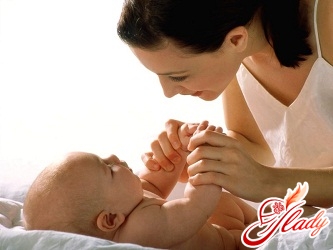
Weight of newborn baby
The weight loss of a newborn baby is verya popular reason for the panic fear of a huge number of young mothers. Approximately on the second day, physicians diagnose a significant loss of body weight in a newborn child - about five percent. Of course, that Mom can not help but worry about her crumbs, but in fact, these fears in almost all cases are absolutely groundless - the weight of the newborn child will very quickly return to normal. This weight loss is explained quite simply. The intestine of the child is completely freed from meconium, which, as already mentioned, is very dense and has a rather large mass. And, in addition, in the first few days a child eats extremely little, which also affects the mass of his body. However, such a loss is an absolutely normal physiological weight and should not be cause for concern. By the way, many mothers constantly ask the same question. How correctly to consider weight gain? From the weight that was at birth or from the weight at discharge from the maternity hospital? Doctors answer this question unequivocally - from weight at birth, and weight at discharge is generally not worth paying special attention if the weight loss does not exceed 10%.
Cases of occlusion of sebaceous glands
Also very often newly mummiesask doctors what white spots are on the face of a crumb. Rashes are similar to white knots, located mainly in the area of the nose, cheeks and forehead. There are similar rashes due to blockage of the sebaceous glands. These nodules can periodically inflame and swell. In the event that they also become inflamed in your crumb, you can wipe them with a cotton swab dipped in an alcohol solution of marigold. However, once again, it is necessary to remind young mothers that the skin of children is extremely tender and sensitive, it can easily be burned. Therefore, it is not necessary to cauterize the rash with a clean alcohol solution of marigold - it must first be diluted with pure boiled water in a proportion of one to one. There is no other treatment for occluding the sebaceous glands in crumbs - about one and a half to two months the rashes will disappear by themselves. Many mothers make a serious mistake when they try to squeeze out the contents of these nodules. This can not be done in any case - you cause your crumb pain, and most importantly, risk bringing pathogenic bacteria, which can lead to the emergence of a strong inflammatory process, up to an abscess requiring surgical intervention.
Sexual crisis
Often in newborn babies can be observedthe following: the mammary glands are densified and swell to a considerable extent, the boys develop swelling of the scrotum, and girls may have spotting from the vagina. It is only natural that such phenomena frighten young mothers. However, in fact, this state of the newborn baby is caused by quite natural causes. During childbirth and during breastfeeding, a huge amount of sex hormones from the mother's organism enters the body of the baby's crumbs. They are what cause such phenomena in crumbs. No such treatment of newborn babies requires any treatment. The only thing that needs to be done in the event that a newborn baby has bloody discharge from the vagina is to wash the baby with a weak solution of potassium permanganate. About how to cook it, it was written above. Do not try to squeeze any liquid out of the swollen breasts! This can lead to serious complications.
Erythema of newborns
Sometimes in newborn babies there is aa phenomenon like physiological erythema. It is characterized by erythema reddening of the skin, which is caused by the fact that the blood vessels in the baby expand considerably, and the blood flow increases many times. A characteristic red shade of the skin begins to acquire in the first hours after childbirth. The growth of redness lasts several days, reaching its peak on the second - third day. Physiological erythema does not require any treatment at all and goes on by itself, approximately to 7 - 10 day of life of the newborn baby. The only thing doctors recommend to do for young mothers is to lay out a naked baby every day for taking air baths. The bath should last approximately 60 minutes, but it is recommended to divide this time into 4 receptions. Be sure to monitor the temperature of the environment - remember that it should be no lower than +20 degrees. The system of thermoregulation of a newborn is still immature and imperfect, therefore, at low temperatures, the possibility of hypothermia of the baby is not ruled out, and as a consequence, the baby can get sick. Toxic erythema occurs a little less often, but also often enough. Toxic erythema is characterized by the appearance on the skin of a newborn baby red pimples resembling vesicles, with liquid contents inside. As a rule, toxic erythema is not an independent disease, but arises as a complication of the physiological erythema of newborns. Typically, this complication occurs if the child is overheating, or if skin irritation occurs, for example, by strong towel rubbing. With toxic erythema, as well as with physiological, doctors assign newborns crumbs to air baths. In addition, a bath with a solution of potassium permanganate is very useful. But never try to diagnose and treat the disease yourself. The danger of toxic erythema is that the risk of pyoderma on its background is very high. Pyoderma is characterized by the appearance on the skin of numerous purulent eruptions.
Urinary crisis of newborns
All waste products of the fetus from histhe organism was removed by excretion of the placenta. And after the crumb was born, he has to cope with this task on his own. In some cases, if the kidneys are not mature enough, they may simply not be able to cope. As a result, there comes a urinary crisis, which manifests itself by the following symptoms:
- Urine is very concentrated - it has a rich shade.
- In the urine often precipitates salts in the form of crystals of salt.
- The child at the time of urination showssigns of anxiety - he bows feet, cries. The pain arises from the fact that urine salts, passing through the urethra, injure and irritate it. This is most often seen in boys.
To eliminate this disease statethe child needs to drink as much as possible. Increased fluid content in the body will greatly dilute the concentration of salts in the urine and will ease the child's condition. As already mentioned, dopaivat baby should be boiled with cool water, small portions, with a spoon. Often bathe your baby - about three to four times a day. By the way, the process of urinating in water is much easier and painless. As a rule, such a urinary crisis passes completely independently, without any outside interference, approximately on 6 - 7 days after birth. However, if you see that the crisis brings painful suffering to the crumb, pay attention to it.
Tremor of newborns
Tremor occurs in about 95% of allnewborn babies. As a rule, for children, a tremor of the chin is characteristic. It manifests itself when the child is crying or hungry - looking narrowly, you can see how trembling the pod has a crumb. Parents should not be afraid of such a tremor - this is how the immature nervous system of the crumbs manifests itself. As a rule, about three months, this state passes independently. But in the event that even after three months of tremor not only does not disappear, but even does not decrease, parents should sound the alarm and seek counseling from a pediatric neurologist or, in his absence, a pediatrician. However, I would like to immediately warn parents of some of the imperfections of domestic medicine: our doctors are very fond of reinsuring and removing all responsibility. Very often, such children are still diagnosed in the maternity hospital as follows: "perinatal encephalopathy" and, accordingly, prescribe medications, which are often not at all necessary. If your child was diagnosed with this condition, be sure to contact several other specialists and listen to their opinion. In no case do not tell the doctors the previous diagnosis.
Newborn transient fever
Newborn transient fever is calledincrease in body temperature in the first week of a child's life. The normal temperature of a newborn baby is approximately 37.5 degrees. However, it often rises to 38, 5 and above degrees and lasts about two or three days. In the special literature, a temperature increase of up to 40 degrees is permissible, but parents should seek medical care at a temperature above 38.5 degrees. The temperature of the baby can also rise for other reasons, in no way associated with transient fever, and without seeking help, you risk missing the onset of a serious illness. And even if the temperature of newborn babies is a consequence of transient fever, remember that hypothermia itself causes crumbs inconvenience and can even lead to the appearance of febrile seizures. Do not go to a clinic with a fevered child - it's much more reasonable to call a doctor or an ambulance at home if it's a weekend or night. If the doctor has confirmed that the crumb is a transient fever, and the temperature is raised slightly, you can independently ease the state of your treasure. Be sure to finish the crumb with cool and clean water from a spoon, bathe in a warm, but not hot bath. Finish the tray with cool douches.
Physiological strabismus
Immediately after birth, almost all withoutthe exclusion of babies is too weak the muscles of the eyes that hold the eyeball. That's why parents can often watch the little eyes of the crumbs either "gather together" at the nozzle, or, on the contrary, diverge in different directions. Of course, parents are frightened when they see this picture. However, worry about this is only if the condition does not continue after three months.
Newborn baby's day regimen
Strictly speaking, the whole mode of the newborn's daythe child is reduced to feeding and sleeping, and also to evening bathing. After all, the first month of his life the baby sleeps a lot. By the way, children's neurologists warn young moms that if a newborn baby does not sleep well, it's an occasion to seek medical help from a doctor. However, if you notice an anxious and restless sleep of your crumbs, carefully monitor whether something is bothering him: cold, pain, uncomfortable clothing, a diaper, collapsed bed linen. In some cases, the crumb can wake itself by not controlling the movements of the pens. A lot of mothers just dream about that the baby as soon as possible began to sleep throughout the night. But the peculiarities of the newborn baby's body are such that during the first month of life, and often not only the first, wakes up at night from feeling hungry. And mum should not miss night feedings at all. For the immature digestive system, crumbs to be without food throughout the night - an impossible task. Incidentally, it is the immature digestive system that causes the newborn baby to regurgitate. Almost all parents are firmly convinced that a small child can not get used to a certain regime of the day. However, this opinion is incorrect - a newborn child is able to adapt to a certain regime of the day in just one week. In order to accustom crumbs to the regime, be strictly consistent in their actions - bathe the baby, massage him and put him to bed at the same time. And all hygienic procedures must be carried out in the same sequence. Redeem the crumb, make him an easy relaxing massage, put on a diaper and put it on or swaddle. By the way, doctors recommend swaddling during the first month at least one leg crumbs, so that he does not wake himself up. As a rule, in such cases, the dream of a newborn child is more calm. After that, turn off the top light, turn on the soft night light, make quieter all the extraneous sounds - TV, music, turn off the loud appliance. In advance, in the evening, prepare everything that you may need during the night feeding and changing diapers: clean diapers, diapers, wet napkins. During night feeding, you should not talk with the baby as well as you do during the night. Often, parents ask about which position it is best to lay crumbs in the crib. Doctors - pediatricians believe that it is more correct to put the child on his side or on his tummy, but not on the back. Sleeping on the back of the baby can belch and choke. But the position of crumbs on the stomach facilitates the escape of gases, especially if you put a warm diaper under your tummy. Young parents should not forget that daily walks should be included in the daily routine of any child. And a newborn baby is not an exception to this rule. The first week after discharge from the hospital, walks should be about 10 to 20 minutes, depending on the season and weather conditions. By the end of the first month of life, walks should be gradually increased to 30 minutes. Walking with a newborn baby needs at least two times a day. We advise you to read:




